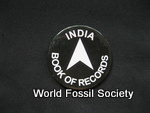An international team of paleontologists has discovered two ancient species of South American rodents, including the oldest chinchilla, a discovery that substantiates what might be the earliest grasslands in the world. The two new species lived near a chain of volcanoes about 32.5 million years ago in what are now the steep slopes of a […]
Archive for July, 2012
A Fossil Preservation Mystery
 July 24th, 2012
July 24th, 2012  riffin
riffin The mystery of how an abundance of fossils have been marvellously preserved for nearly half a billion years in a remote region of Africa has been solved by a team of geologists from the University of Leicester’s Department of Geology. They have established that an ancient wind brought life to the region – and was […]
WFS Dinosaur Diary : MAIASAURA (MY-ah-SORE-ah)
 July 23rd, 2012
July 23rd, 2012  riffin
riffin Period: Late Cretaceous Order, Suborder, Family: Ornithischia, Ornithopoda, Hadrosauridae Location: North America (United States) Length: 30 feet (9 meters) Since it was named in 1979 by John Horner and Robert Makela, Maiasaura has become one of the most famous dinosaurs. It has provided information about how it cared for its young and the early development of dinosaurs. The name Maiasaura […]
Fossil raindrops reveal ancient atmosphere
 July 22nd, 2012
July 22nd, 2012  riffin
riffin The fossilised marks of raindrops that fell 2.7 billion years ago in South Africa have revealed the composition of the Earth’s early atmosphere. According to a new study published in Nature today, the early Earth had an atmosphere with similar air pressure to the present day, but much higher levels of greenhouse gases. The findings, from a […]
Gigantic Trilobite Fossils Found in Portugal
 July 21st, 2012
July 21st, 2012  riffin
riffin Scientists recently announced the discovery of the largest Trilobites ever seen. Trilobites were primitive marine arthropods distantly related to modern-day horseshoe crabs. They lived for millions of years before the dinosaurs. Trilobite Fossil Some of the fossils from Portugal measure nearly three feet long, far more than even the largest trilobite fossils previously known. […]
Insect damage on Eocene fossil plants may predict global warming consequences
 July 20th, 2012
July 20th, 2012  riffin
riffin Paleontologists and biologists reported an analysis of insect damage to Eocene fossil plantsthat has implications for what may happen as a result of present day global warming in the open access peer reviewed journal Public Library of Science on July 18, 2012. Samples of insect-feeding damage on the two middle Eocene plant groups from the Messeland Eckfeld sites in Germany were examined from specimens from […]
The World’s Richest and Most Extensive Marine Bone Deposit
 July 19th, 2012
July 19th, 2012  riffin
riffin Killing Field” or “Sudden Die-Off?” In the famed Shark tooth Hill Bone Bed near Bakersfield, Calif., shark teeth as big as a hand and weighing a pound each, intermixed with copious bones from extinct seals and whales, seem to tell of a 15-million-year-old killing ground. Yet, new research by a team of paleontologists from the […]
Biomechanical modelling Reveals Eating Habits of Giant Dinosaurs
 July 18th, 2012
July 18th, 2012  riffin
riffin High-tech technology, traditionally usually used to design racing cars and aeroplanes, has helped researchers to understand how plant-eating dinosaurs fed 150 million years ago. A team of international researchers, led by the University of Bristol and the Natural History Museum, used CT scans and biomechanical modelling to show that Diplodocus — one of the largest […]
10 million years to recover from mass extinction
 July 17th, 2012
July 17th, 2012  riffin
riffin It took some 10 million years for Earth to recover from the greatest mass extinction of all time, latest research has revealed. Life was nearly wiped out 250 million years ago, with only 10 per cent of plants and animals surviving. It is currently much debated how life recovered from this cataclysm, whether quickly or […]
Fossils reveal ice sheet vulnerability to global warming
 July 16th, 2012
July 16th, 2012  riffin
riffin Sea levels may rise much higher than previously thought, according to scientists from The Australian National University, who have used fossil corals to understand how warmer temperatures in the past promoted dramatic melting of polar ice sheets. Dr Andrea Dutton, formerly of the Research School of Earth Sciences (RSES) in the ANU College of Physical […]



 Posted in
Posted in 
